Key takeaways:
- Personalized mental health strategies, such as journaling and adapting techniques over time, are crucial for effectively managing well-being.
- Practices like deep breathing, time management, and setting boundaries can significantly alleviate stress in daily life.
- Engaging with professional support systems fosters resilience, offering tools and shared experiences that empower individuals to navigate challenges and acknowledge personal progress.
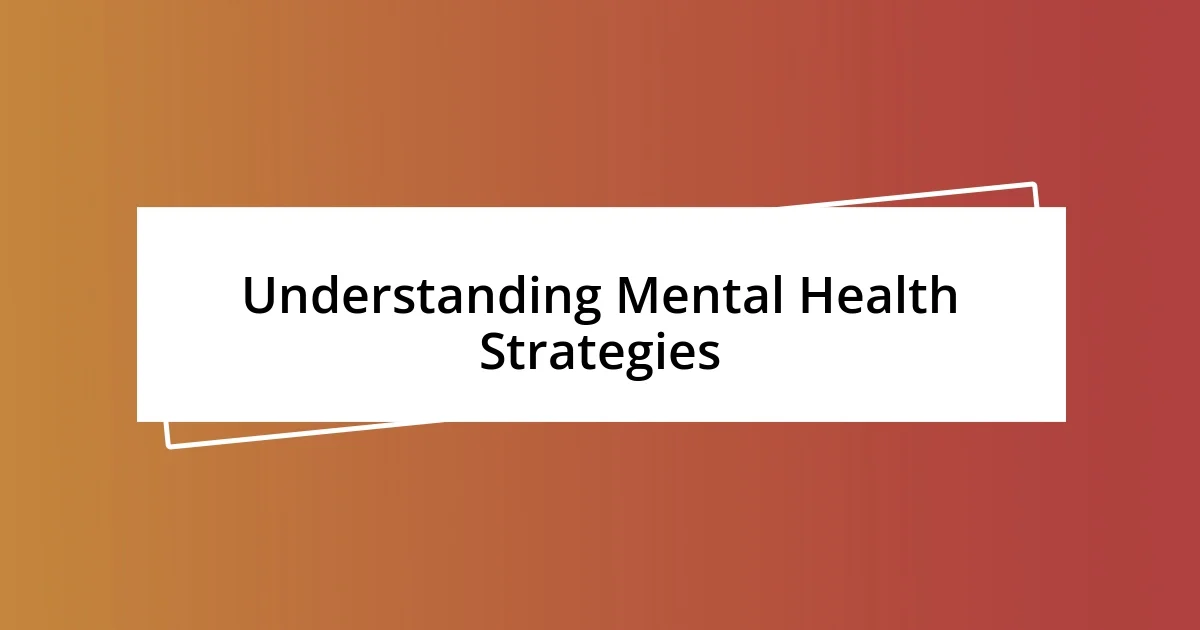
Understanding Mental Health Strategies
Understanding mental health strategies is crucial for fostering well-being in our lives. From my observations and experiences, I’ve found that creating a personalized approach is often more effective than following generic advice. Have you ever felt overwhelmed by the sheer volume of strategies available? I certainly have, and I’ve learned that identifying what resonates with me makes all the difference.
For instance, I remember the time I started journaling as a way to process my thoughts. Initially, it felt daunting, like spilling my secrets onto a blank page. But once I embraced it, I discovered a profound clarity and relief that I never anticipated. This simple act became not just a strategy but a vital part of my self-care routine. Isn’t it fascinating how something so personal can yield transformative results?
Moreover, mental health strategies are not one-size-fits-all. They should adapt over time, reflecting our changing needs and circumstances. I’ve often reassessed what works for me—some days meditation feels essential, while other days, a brisk walk outdoors does the trick. What strategies have you found to be adaptable in your life? Engaging with our mental health means we continually explore new methods while honoring what has worked for us before.

Importance of Tailored Approaches
Tailored approaches in mental health strategies acknowledge the uniqueness of each individual’s experiences and needs. I’ve seen firsthand how what works wonders for one person might fall flat for another. For instance, my friend struggles with anxiety and has found yoga to be her saving grace, while I tend to lean more on cognitive behavioral techniques. It’s these customized approaches that resonate on a deeper level, making the journey to mental wellness feel more authentic and sustainable.
- Individual preferences shape effectiveness: What one person enjoys may not suit another.
- Dynamic needs require flexibility: As we evolve, so too should our mental health strategies.
- Personal experiences enhance comprehension: Relating to our own struggles makes us more invested in the solutions.
- Support systems foster identity: Sharing tailored strategies can strengthen bonds and enrich community support.
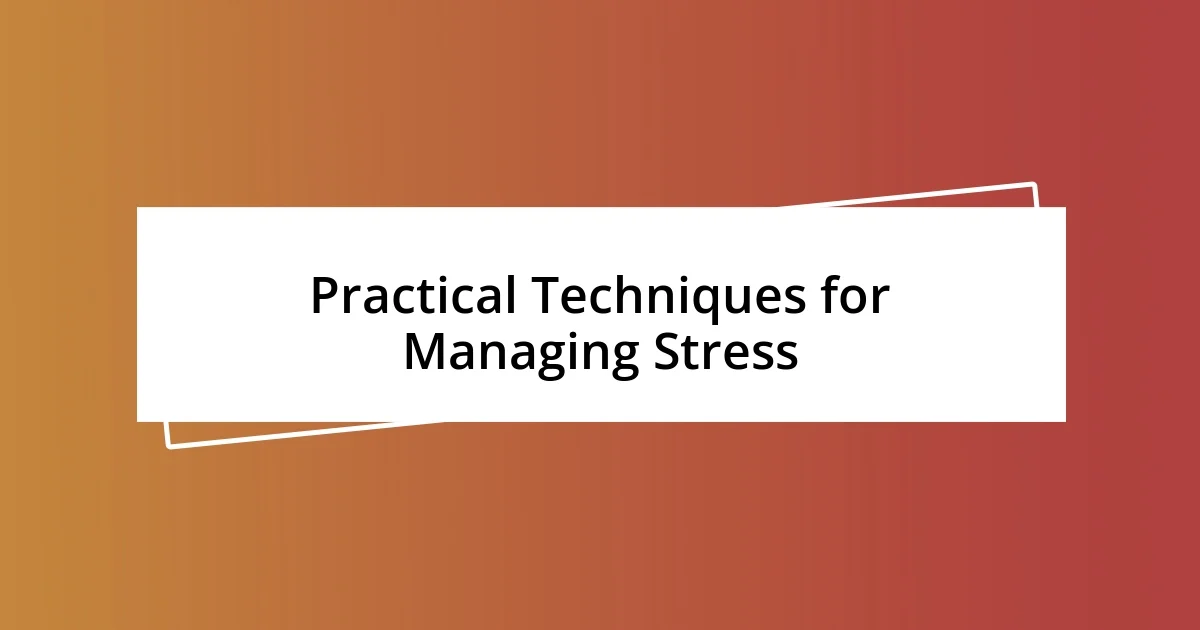
Practical Techniques for Managing Stress
Managing stress is crucial for maintaining mental health, and I’ve discovered several practical techniques that can make a significant difference. One method that has worked well for me is deep breathing exercises. Whenever I feel that tightness in my chest during stressful moments, I take a minute to focus on my breath, inhaling slowly for four counts and exhaling for six. This simple practice helps center me, bringing clarity to my mind and easing my tension.
Another technique I’ve found invaluable is time management through prioritization. I usually create a daily to-do list, highlighting the most pressing tasks. There was a week when I felt overwhelmed with deadlines. By breaking down projects into smaller, manageable steps and prioritizing them, I was able to regain control over my time and reduce my stress. It’s amazing how a little organization can create such a sense of calm.
Lastly, I’ve learned the importance of setting boundaries. I remember the time I took on too many commitments, thinking I could juggle it all. It didn’t take long for that to backfire, leading to exhaustion and frustration. Establishing clear boundaries about what I can handle has allowed me to devote energy to the things that truly matter to me, significantly easing my stress levels. Have you considered how setting your boundaries could help navigate your stress?
| Technique | Description |
|---|---|
| Deep Breathing | Focus on your breath to center your mind and reduce tension. |
| Time Management | Organize and prioritize tasks to regain control and lower stress levels. |
| Setting Boundaries | Establish limits on commitments to protect your time and energy. |
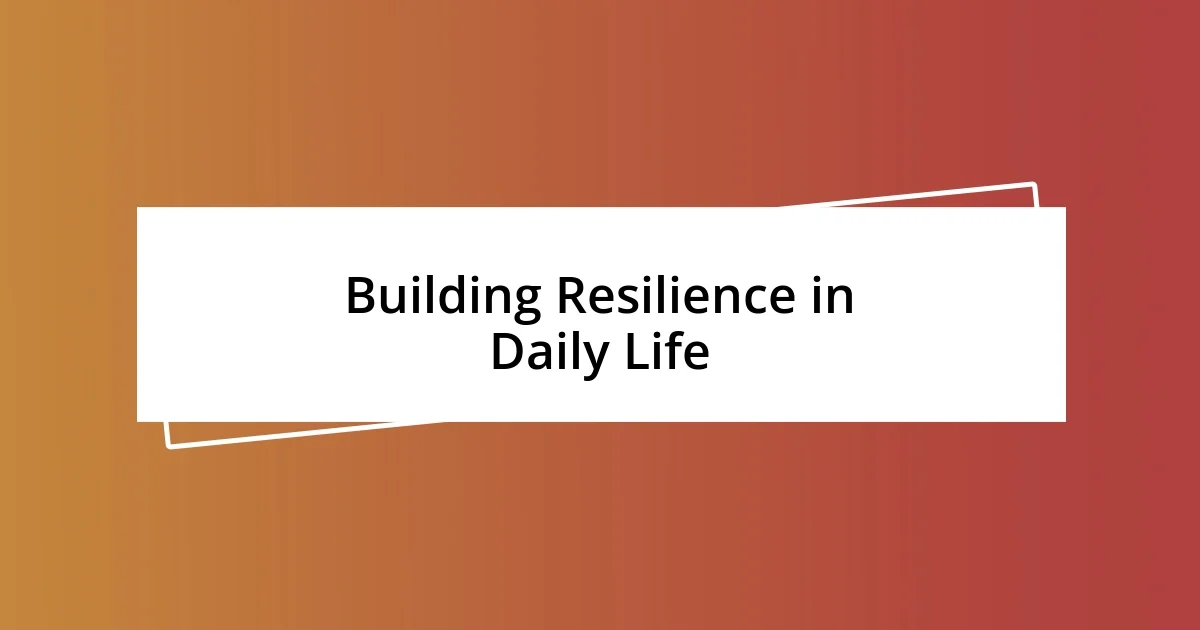
Building Resilience in Daily Life
Building resilience in daily life involves adopting practices that strengthen our ability to bounce back from challenges. I remember a particularly challenging period when I faced several personal losses in a short time. Instead of retreating from the world, I chose to lean into activities that brought me joy, like spending time in nature. This intentional shift not only helped me find solace but also built my resilience, reminding me that even in tough times, I could still cultivate moments of happiness.
Another essential aspect of resilience is creating a supportive environment. Have you ever felt uplifted just by being around positive people? I have. After a rough week, I reached out to friends who uplift me, and our conversations reminded me of my strengths. Sharing experiences with those who understand can transform feelings of isolation into newfound hope. It’s like having a safety net that catches you when you stumble, allowing you to rise again with renewed strength.
Lastly, reflecting on past challenges can fuel our resilience. I often find myself revisiting difficult experiences, not to dwell on them, but to acknowledge how far I’ve come. Each struggle taught me something valuable, like patience or the importance of self-compassion. Have you thought about how learning from your struggles could empower you in future situations? I’ve found that by framing challenges as opportunities for growth, I not only build my resilience but also enhance my overall perspective on life.
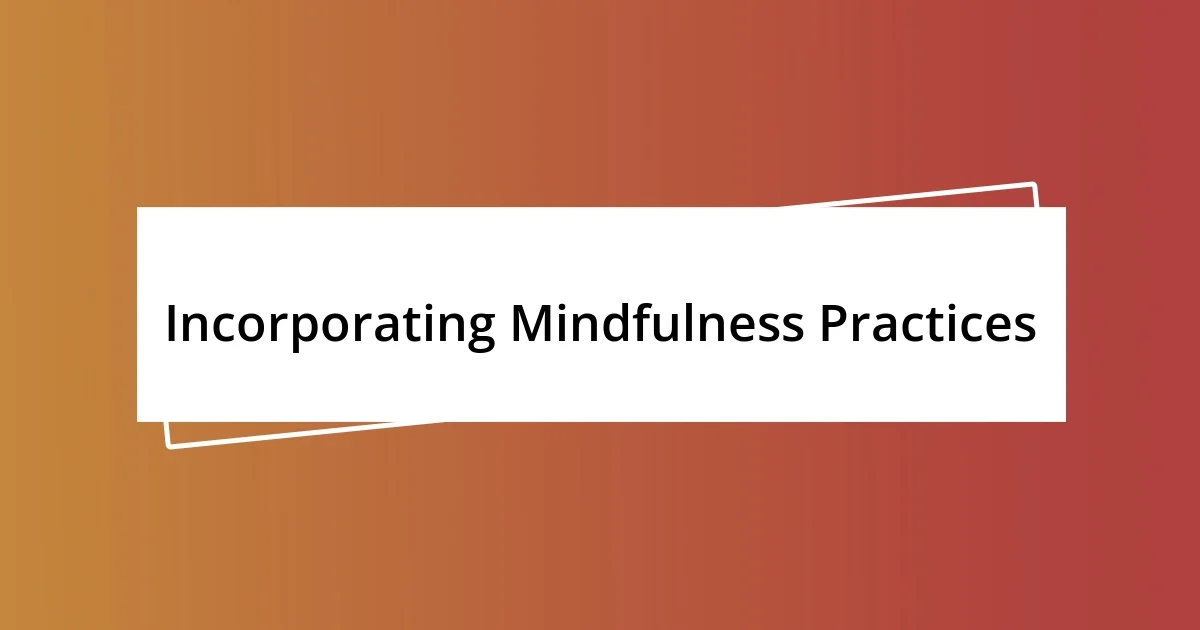
Incorporating Mindfulness Practices
Incorporating mindfulness practices into daily life has been a game-changer for my mental well-being. I remember the first time I tried a mindfulness meditation app; I was skeptical, thinking I would just end up distracted. But as I sat quietly, focusing on my breath, I began to notice how much calmer my thoughts became. Have you ever experienced that relief when your mind finally quiets down? It’s remarkable!
One of my go-to techniques is mindful walking. I recall taking a stroll in the park one afternoon, consciously feeling each step I took. As I walked, I focused on the sensations of my feet connecting with the earth, the gentle rustle of leaves in the breeze, and the warmth of the sun on my skin. This practice pulled me into the present moment, reminding me of the beauty around me. Have you ever just paused to relish the little joys of life?
Moreover, I’ve also started incorporating gratitude journaling as a form of mindfulness. Every evening, I jot down three things I’m grateful for, no matter how small. Just the other night, I wrote about the warm cup of tea I enjoyed while watching the sunset. This simple act shifts my focus from stress to appreciation and cultivates a positive mindset. How often do we take the time to acknowledge the good in our lives? It’s these little moments that truly enrich our mental health journey.
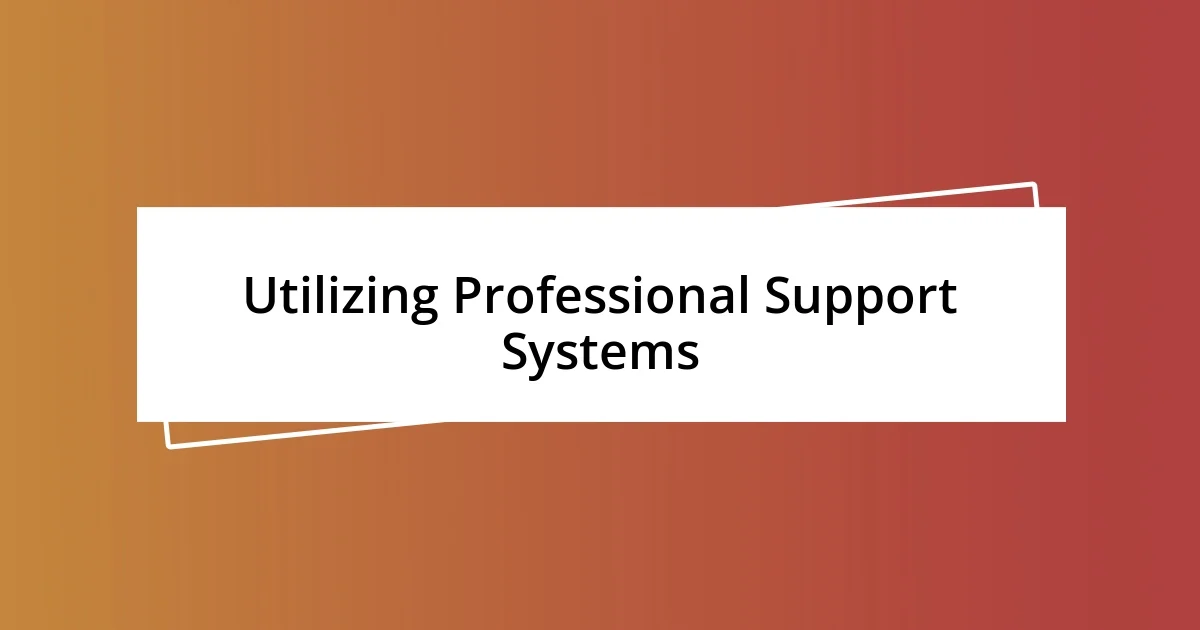
Utilizing Professional Support Systems
Utilizing professional support systems can be a transformative step in managing mental health. I still remember my first therapy session; I felt both nervous and hopeful. It was a safe space where I could openly discuss my feelings without judgment. Have you ever wished for someone who truly listens? Professional support offers that—a dedicated listener who provides tools and techniques to navigate through life’s complexities.
Engaging with therapists, counselors, or support groups can also provide a fresh perspective. During a particularly tough phase in my life, I joined a support group. At first, I hesitated, thinking my issues weren’t significant enough to share. But as I listened to others’ experiences, I realized we all struggle in different ways. It was eye-opening! I found strength in shared vulnerability, which helped me feel understood and less isolated. Have you explored the idea of joining a group where you can share and learn from others?
Moreover, seeking professional guidance has long-term benefits that extend beyond immediate relief. A few months into my therapy journey, I learned about cognitive behavioral techniques that changed how I approached negative thoughts. Instead of feeling trapped, I started viewing challenges as manageable, which was empowering. Have you thought about how the right support can equip you with lifelong strategies? I’ve discovered that professional support isn’t just about addressing crises but also about building a stronger, more resilient you for the future.
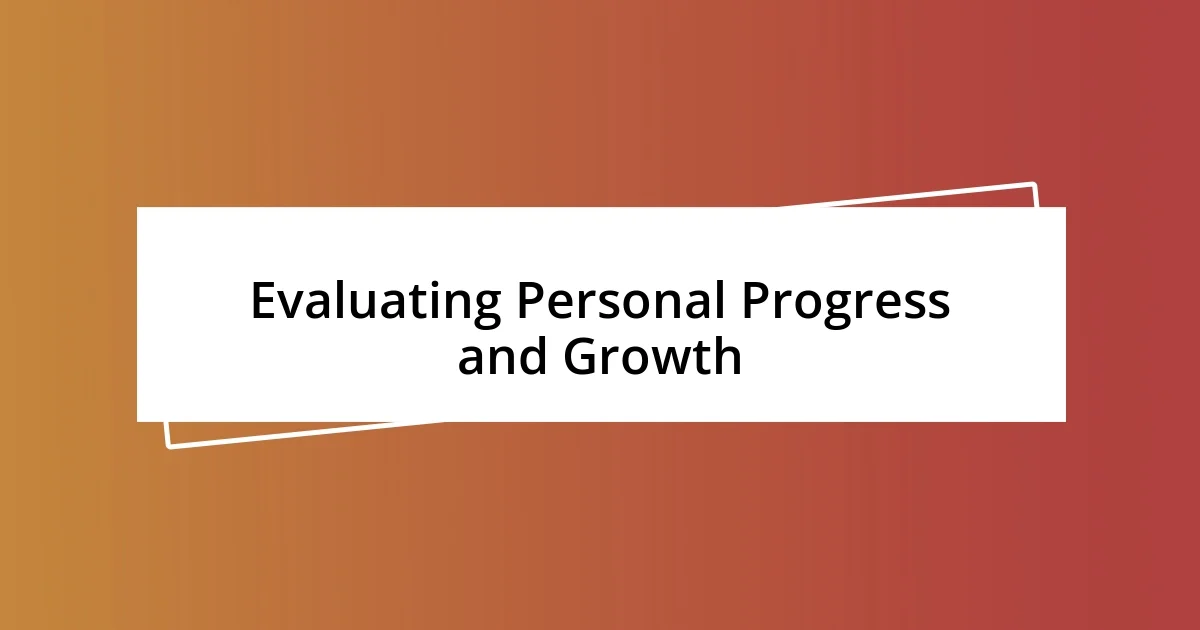
Evaluating Personal Progress and Growth
Evaluating personal progress is a crucial aspect of mental health growth. I often find it helpful to reflect back on where I started and how far I’ve come. For instance, a year ago, I struggled with anxiety that often felt overwhelming. Recently, I compared my journal entries and noticed that I can now articulate my feelings instead of letting them consume me. Isn’t it empowering to see tangible evidence of progress?
One technique I’ve embraced is setting specific goals and regularly assessing them. I remember creating a mindfulness practice checklist at the beginning of my journey and checking off items weekly. It was eye-opening to see which practices resonated with me, and how consistently engaging with them reduced my stress. Have you tried setting small, achievable goals? I believe that even the smallest victories deserve recognition, as they lay the groundwork for greater changes.
Additionally, I’ve learned that self-compassion plays a vital role in this evaluation process. During times when I felt I wasn’t making enough progress, I reminded myself that growth isn’t linear. There were days where setbacks felt discouraging, but embracing these moments allowed me to understand my own rhythm. How do you measure your growth? I’ve discovered that each step, no matter how small, is an important part of the journey towards better mental health.












